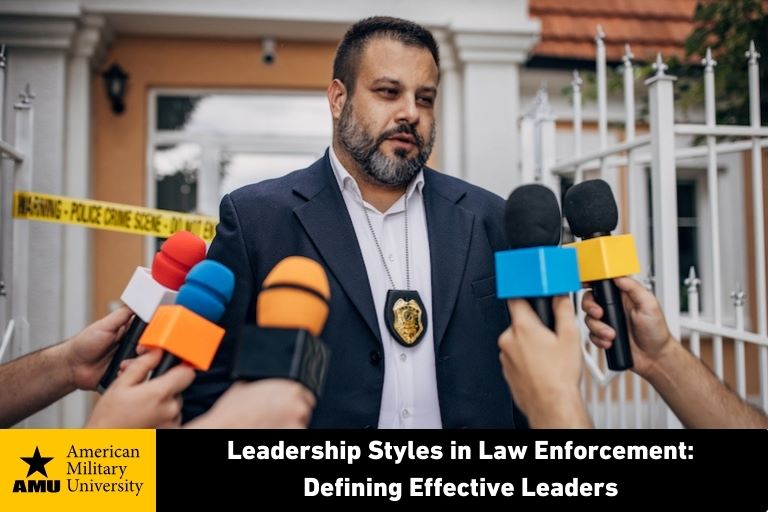By Dr. Nicole Cain | 07/11/2024

The rapidly changing political and social climate in the United States presents new challenges for law enforcement and requires exceptional leaders to navigate through them. Effective leadership styles in law enforcement are crucial.
Ideally, administrators and line supervisors must possess skills that allow them to connect with a wide-ranging demographic within their police agency and remain dedicated to their primary mission of serving the public. Ultimately, the success of a law enforcement agency is dependent upon the effectiveness of its leaders.
To truly understand effective law enforcement leadership, it is essential to listen to those people who have led and followed in a police organization. I conducted a research project to identify the most effective leadership skills and styles, collecting data from a mid-sized police department in central Florida. My dual-faceted research approach involved observing officers, line leaders, and administrators in a typical workday setting.
I also conducted interviews with a mid-level supervisor to glean further insight into effective leadership attributes, leadership training, leadership style, and the role and effectiveness of informal leaders within a police agency.
Effective Styles of Leadership in Law Enforcement
From my study, two leadership styles emerged as critical in law enforcement. They are situational leadership and transformational leadership.
Situational Leadership
The situational leadership style requires leaders to quickly assess a situation and recognize the appropriate personnel and resources needed for a specific mission. Because the nature of police work is both high-risk and dynamic, it is important for a leader to navigate through evolvingand often dangerous circumstances.
Possessing the ability to digest information quickly and make decisions under pressure is paramount. Situational leadership is often reactive and should not be the primary police leadership style for law enforcement leaders today.
Transformational Leadership
This style of leadership focuses on encouraging the success of others. A transformational leader develops a vision of the future intended to excite and inspire followers. Ideally, transformational police leaders evoke valuable and positive change in their followers with the end goal of teaching aspiring law enforcement leaders to become effective supervisors.
Transformational leaders can foster a positive change in their agencies and communities by addressing the low morale of police officers who perform in an anti-police society. The animosity, mistrust, and criticism of law enforcement is present on the news, social media, and our streets.
A transformational leader must foster collaboration by mending employees’ wounds both internally and externally. Leaders can inspire officers by highlighting their achievements, recognizing their strengths, providing opportunities for growth, and honing their skills.
The Characteristics Needed by Strong Leaders
Strong leaders in law enforcement must be adept at both communicating clearly and making decisions swiftly. They should be able to convey expectations to their frontline officers, provide clear instructions, and listen to the concerns and suggestions of their subordinates.
Effective decision-making in police leadership often requires a balance between confidence and humility. This balance ensures that leaders make choices with the best available information and consider the input coming from various levels within the organization.
Hierarchy Awareness and Delegation Skills
There is a defined command hierarchy in all law enforcement departments. Most police forces are designed with a paramilitary rank structure, and officers are expected to follow the chain of command. It is important for police leadership to delegate responsibilities and trust their subordinates to successfully execute those duties with minimal oversight.
Police leaders must build a network of trust and accountability from the top down through the ranks while fostering new leaders and encouraging new ideas. Providing officers with informal leadership roles is paramount to the professional development of officers as well as the implementation of new ideas in the agency.
Honesty
An important attribute of good leaders is honesty. Police leadership needs to be transparent and direct with their subordinates.
Dishonest law enforcement leaders create chaos in their agency because they lose credibility with their “flock,” and a leaderless flock will inevitably fail. Officers thrive in a structured environment with leaders who follow the rules and prescribed consequences.
An Ability to Motivate and Reward Subordinates
Law enforcement commanding officers must lead the entire agency. To effectively inspire people to be followers, leaders must understand their respective agency and community’s demographic. Good police leadership can relate to people of all generations and cultures and understands the best strategies to motivate them.
Field Knowledge and Encouraging Education and Professional Growth
As a profession, law enforcement is constantly evolving. Such ongoing change requires commanding officers such as police chiefs to stay on top of the development of new laws and technology.
While it’s not always necessary for a leader to have a college education, it is often beneficial. Formal education tends to challenge officers’ perspectives and it encourages them to seek out learning opportunities.
Leaders should strive to foster an environment that encourages learning and growth and provides training opportunities. This type of environment should also promote the sharing of ideas and the development of innovative ways to accomplish goals.
Caring about Officers’ Wellbeing
Law enforcement executives must recognize the importance of continuance in leadership. The most effective police leaders are the ones who genuinely care about subordinates such as patrol officers and want them to be successful, both professionally and personally. Current officers are future leaders and must be served and supported.
The Need to Develop a Strong Leadership Style in Law Enforcement
The role of law enforcement rarely remains fixed, but the methods by which law enforcement officers serve and protect shifts with the political climate. Leadership styles in law enforcement play a crucial role in adapting to these changes.
A law enforcement leader must understand the nuances of the profession and the shifting political climate to guide their officers. To be an effective police leader, officers must also possess certain attributes that influence others to follow them. The key findings of my research illustrate the importance of situational and transformational law enforcement leadership, honesty, and the role of informal leaders within a law enforcement agency.
Criminal Justice Degrees at American Military University
American Military University (AMU) offers a range of criminal justice degree programs tailored for individuals who are passionate about learning law enforcement, public safety, criminal justice, and an effective leadership style in the law enforcement field. Ideal for current and aspiring law enforcement professionals, courses are delivered online and provide flexibility for working professionals.
AMU's faculty consists of experienced instructors, including former police officers and military personnel, who bring real-world insights to their teaching. Our degree programs emphasize practical knowledge, ethical standards, and the latest industry practices, ensuring graduates have the potential to be well-prepared to seek various roles within the criminal justice field.
Bachelor of Arts in Criminal Justice
The online bachelor of arts in criminal justice at AMU equips students with comprehensive knowledge and skills pertinent to the criminal justice field. Students have the chance to learn about the various components of local, state, and federal criminal justice systems and gain an international perspective.
Students will also explore political and public administration, apply prevailing theories to practical situations, and design research projects. Students also have the opportunity to understand how standards of evidence and law impact different segments and professionals within the criminal justice system.
Bachelor of Science in Criminal Justice
The online bachelor of science in criminal justice program at AMU focuses on helping students to develop an understanding of crime, criminal behavior, and digital forensic science. Students will have the opportunity to learn essential investigative techniques and delve into the ethical considerations necessary to deliver justice. This degree program emphasizes building analytical and communication skills, which are crucial for seeking law enforcement job opportunities.
Throughout the program, students participate in activities that potentially prepare them for real-world criminal justice scenarios. They will conduct thorough investigations into criminal activities, gather and analyze evidence, and develop skills in digital forensics.
This criminal justice program also includes opportunities for students to practice ethical decision-making and apply their knowledge in practical settings, ensuring they are well-equipped to handle the complexities of the criminal justice system.
Master of Arts in Criminal Justice
The online master of arts in criminaljustice at AMU encourages a deep understanding of criminal justice systems, criminal behavior theories, and emerging criminal threats. Students have the chance to analyze biological and psychological theories of criminal behavior, evaluate modern criminal threats like terrorism, and assess the rule of law and its societal impacts. Emphasizing critical thinking, the program covers the dynamics among police, prosecution, courts, and corrections.

Dr. Nicole Cain has 20+ years of law enforcement experience as patrol operations, uniform crime scene, COP, and criminal investigations. She is currently assigned to the Criminal Investigations Section’s Felony Intake Office and prepares all felony cases for the State Attorney’s Office. She recently earned her Ed.D. in Organizational Leadership.

